 While you may not want to live forever, it is safe to say that most of us would like to live to a wise old age. Unfortunately, we can't escape to Neverland or drink from the fountain of youth to stay perpetually young. But luckily, there are several other effective strategies we can use to age gracefully and healthily. One may involve managing your cortisol levels. Cortisol is known for its role in stress. However, new research shows there is also a relationship between cortisol and longevity. Having high, low, or dysregulated cortisol may speed up various mechanisms of aging, including heart disease, diabetes, and inflammation. We explore how this relationship works and how you can regulate cortisol to slow down aging.
While you may not want to live forever, it is safe to say that most of us would like to live to a wise old age. Unfortunately, we can't escape to Neverland or drink from the fountain of youth to stay perpetually young. But luckily, there are several other effective strategies we can use to age gracefully and healthily. One may involve managing your cortisol levels. Cortisol is known for its role in stress. However, new research shows there is also a relationship between cortisol and longevity. Having high, low, or dysregulated cortisol may speed up various mechanisms of aging, including heart disease, diabetes, and inflammation. We explore how this relationship works and how you can regulate cortisol to slow down aging.
Cortisol is a hormone that your body produces, often in response to stress. Your adrenal glands, two glands that sit on top of your kidneys, produce this hormone. This hormone is needed for optimal body functioning and has many important roles. One of the most well-known roles is that it regulates your stress response. Cortisol is responsible for the "fight or flight" response in your body. It's responsible for telling your body whether it's safe or if there's danger nearby and will help your body respond to the danger. This is why it's possible for individuals to do remarkable feats in the case of danger.
Other important roles of cortisol include:
Cortisol is a "fight or flight" hormone that is closely tied to the body's stress response. the NeuroEndoMetabolic (NEM) stress response system is the body's way of handling stress. The NEM system consists of six different circuits or related organ systems that work together to distribute the load of coping with a stressor.
One of the NEM circuits is the hormonal circuit. It consists of the adrenal glands, thyroid glands, and reproductive organs and is responsible for the hormonal responses in the body, including cortisol production. However, chronic stress can cause imbalances within the NEM system to occur.
Your body can handle short-term stress. However, in the case of long-term stress, cortisol levels are at first chronically high, and eventually the adrenal glands become depleted and cause cortisol levels to become low. This condition is known as Adrenal Fatigue Syndrome (AFS). It can lead to several imbalances within the NEM circuits. Common symptoms of an imbalance within the hormonal circuit are fatigue, weight gain, low libido, and infertility.
Your levels of cortisol can be determined with either a blood, urine, or saliva test. Originally tests were only done at a health practice. However, there has been an increase in the production of at-home test kits.
When you receive your results from the cortisol test, the levels will either be:
If the result is low or high and continues to remain out of range, it can affect your health. Let's explore the relationship between the different levels of cortisol and longevity.
 In times of stress, it's natural for your cortisol levels to increase. However, once the stressful situation has passed, cortisol levels generally return to their optimal range. A high cortisol level is when the cortisol in your body, remains above the optimal range regardless of whether or not there is a stressful situation.
In times of stress, it's natural for your cortisol levels to increase. However, once the stressful situation has passed, cortisol levels generally return to their optimal range. A high cortisol level is when the cortisol in your body, remains above the optimal range regardless of whether or not there is a stressful situation.
Several circumstances can cause high cortisol levels, including chronic stress, certain tumors, and medications.
In times of stress, your body needs to adapt, and it does this by stimulating the adrenal glands to release adrenaline and cortisol. This release of hormones helps your body respond to stress and danger and is part of your fight and flight response.
In short-term stress, your adrenal glands will produce adrenaline and cortisol. These levels will increase and then go back within the optimal ranges. However, if the stress becomes chronic, this can cause your adrenal glands to continue to release adrenaline and cortisol and can result in high cortisol levels. This is often seen in the early stages of AFS.
This gland, also known as the master gland, is responsible for releasing many important hormones in the body. When your hypothalamus is activated, it releases corticotrophin-releasing hormone (CRG), which triggers the pituitary gland to release adrenocorticotropic hormone (ACTH), which then triggers the adrenal glands to produce cortisol.
If the pituitary gland is overstimulated, it can cause the adrenal glands to continuously produce cortisol, increasing cortisol levels in the body. Conditions that can cause the pituitary gland to become overstimulated include:
These tumors can either be benign or cancerous and sit on top of your adrenal glands. Benign tumors are more common and often cause no symptoms. Cancerous tumors are rare, with only an estimated 200 identified per year in the US. These tumors can cause the release of hormones that include cortisol and aldosterone.
Corticosteroids are a class of medications that can help to provide relief to individuals experiencing asthma, arthritis, inflammation, and cancer. However, if these medications are used for a long period, they can cause high levels of cortisol. Therefore it is important to go to your healthcare professional for regular follow-ups for monitoring if you are taking this kind of medication.
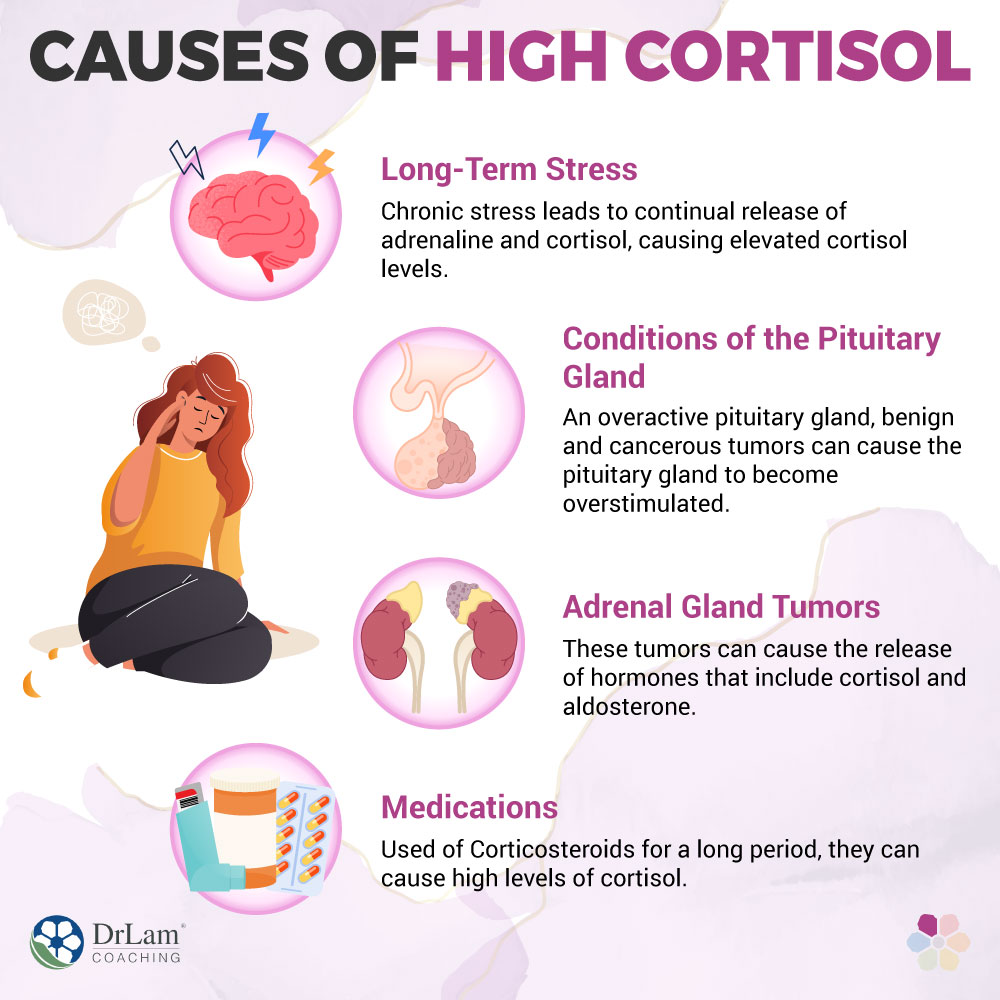
Several symptoms can appear when your cortisol levels are high. These symptoms include:
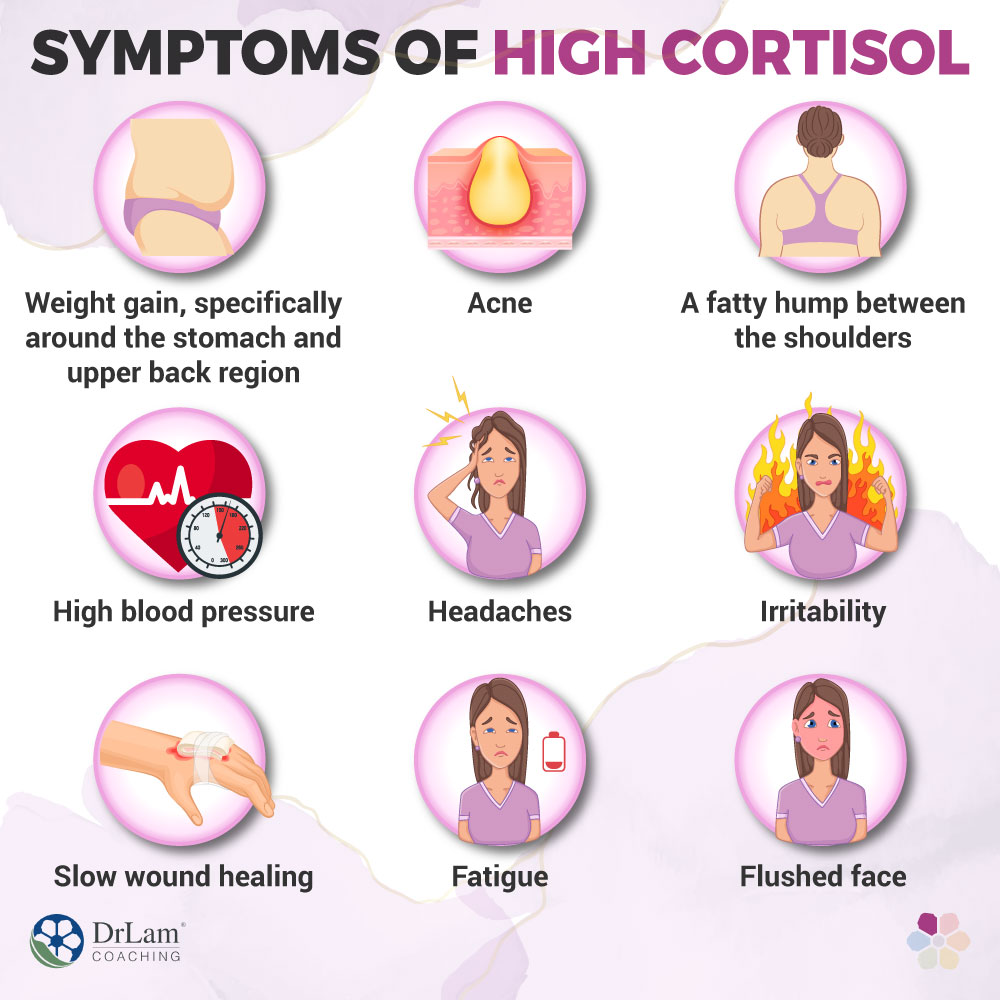
If cortisol levels continue to be high, it can have multiple effects on your health. It may increase your risk of insulin resistance, increase cholesterol and heart problems, worsen osteoporosis, and negatively affect your mental health.
Cortisol is an important hormone in managing blood sugar levels. If cortisol is high, it can cause blood sugar levels to become high. In response to high blood sugar levels, your body releases the hormone insulin to stimulate your cells to take in the free glucose and help to maintain balanced blood sugar levels. However, when glucose levels remain high, your body can become resistant to the hormone insulin. This resistance will result in higher blood sugar levels and can result in the development of diabetes.
 Not only does cortisol have an effect on blood sugar levels, but it can also affect blood pressure. When cortisol is continuously high, it causes blood pressure to rise. This increase in blood pressure causes extra pressure on the heart. High cortisol also increases the fat within the body along with cholesterol and triglycerides. When these become high, the extra fat starts to line the insides of the blood vessels. This increases the risk of a heart attack and/or stroke if the blood vessels become completely blocked by the fatty build-up.
Not only does cortisol have an effect on blood sugar levels, but it can also affect blood pressure. When cortisol is continuously high, it causes blood pressure to rise. This increase in blood pressure causes extra pressure on the heart. High cortisol also increases the fat within the body along with cholesterol and triglycerides. When these become high, the extra fat starts to line the insides of the blood vessels. This increases the risk of a heart attack and/or stroke if the blood vessels become completely blocked by the fatty build-up.
Your bone health is maintained by an impressive system within your body that involves your bones, intestines, and kidneys. When calcium levels are low, your kidneys reabsorb calcium, preventing it from being lost through the urine, the intestines absorb calcium from food, and the bones are broken down to increase calcium in the blood. When calcium levels are high, the bones use the extra calcium to build up the bone, and the amount of calcium reabsorbed or absorbed from the kidneys and intestines is altered.
High cortisol levels reduce the absorption of calcium in the intestine and increase the loss of calcium through the urine. This results in levels of calcium dropping in the blood and the bones being broken down to increase calcium levels. If this occurs over a long-term basis, it can cause osteoporosis.
When the adrenal glands release cortisol into the blood, it can cause a feeling of euphoria. You may have noticed this feeling after an adrenaline-pumping experience such as a rollercoaster ride. Whilst this feeling is pleasant, if cortisol continues to be high within the body, it can cause the opposite: feelings of irritability, anxiety, and depression.
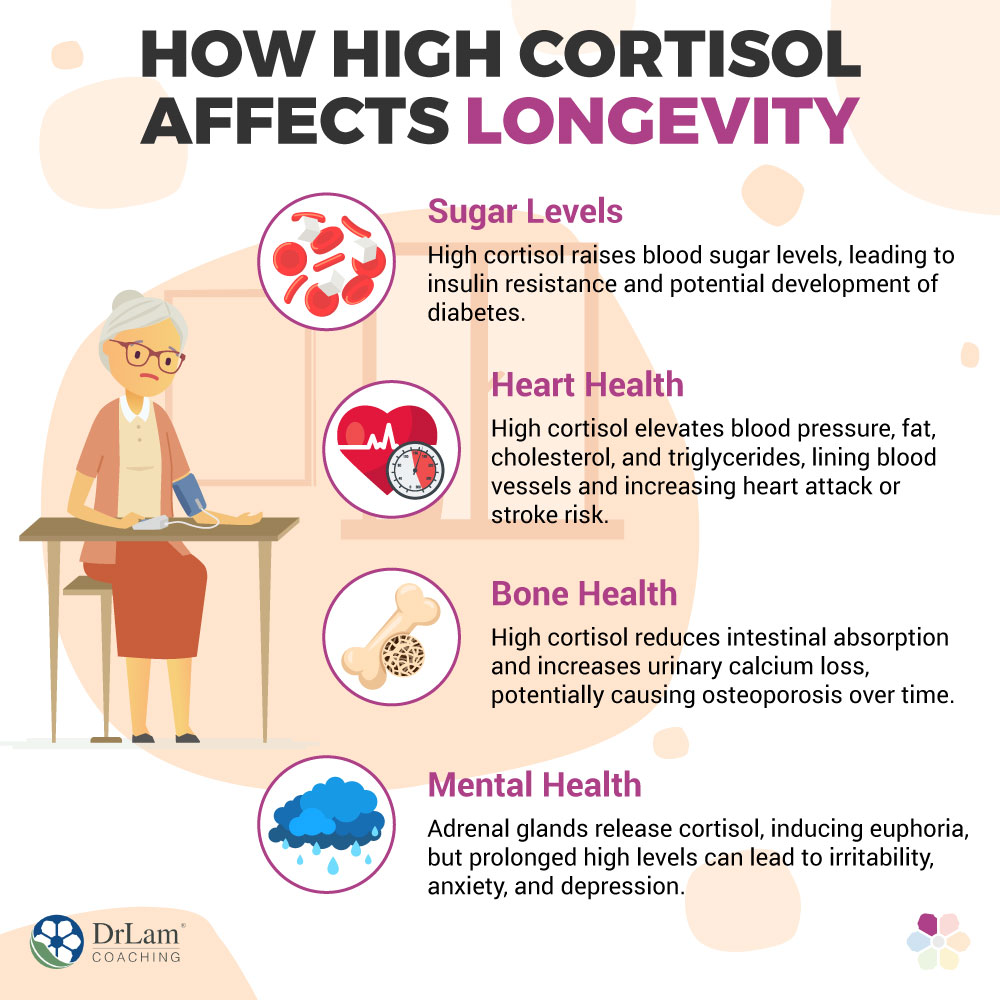
At the other end of the spectrum is low cortisol. Whilst there is a relationship between high cortisol and longevity, there is also a relationship between low cortisol and longevity. Low cortisol, also known as cortisol deficiency, is when your cortisol levels are below the normal range.
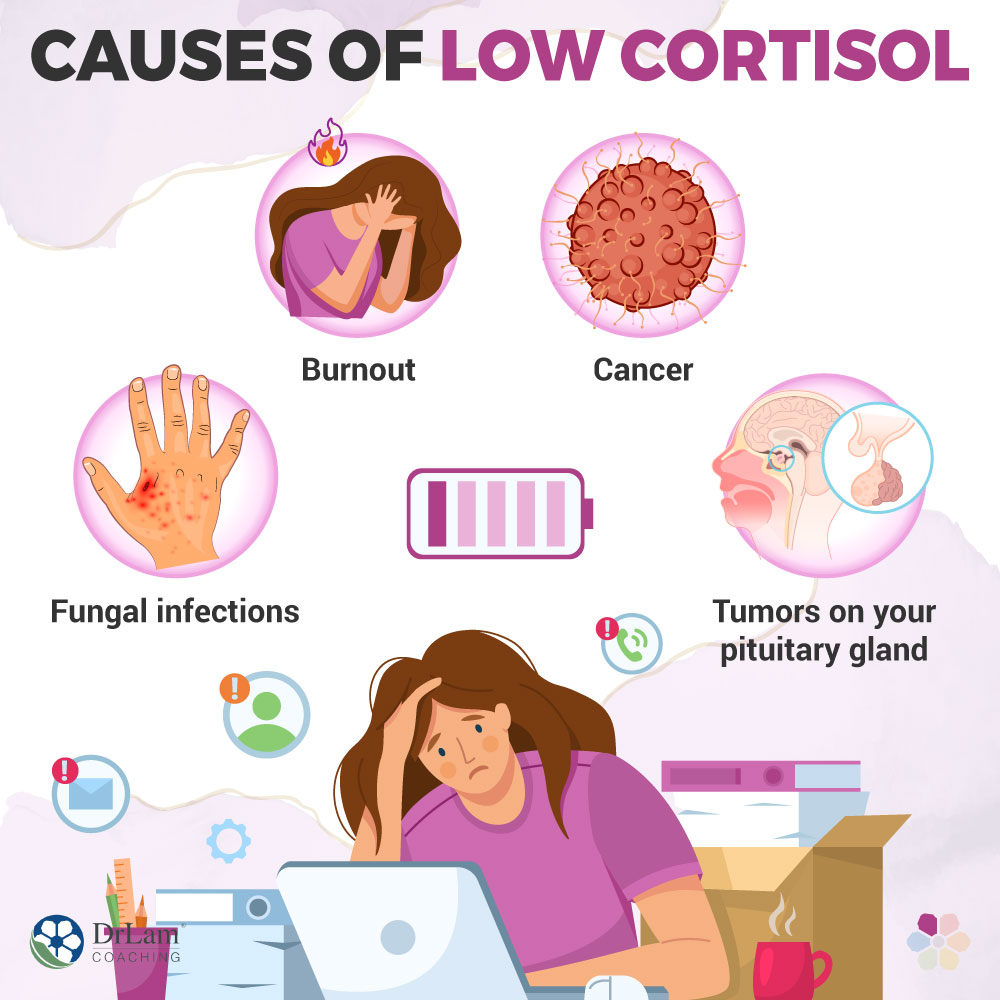
One main cause of a low cortisol level is burnout. When there is long-term stress, your adrenals will become depleted, and the amount of cortisol that your adrenals produce will reduce, eventually becoming lower than the optimal range. This corresponds to the later stages of adrenal fatigue.
Other causes of low cortisol levels include:
These symptoms are warning signs of cortisol deficiency. They include:
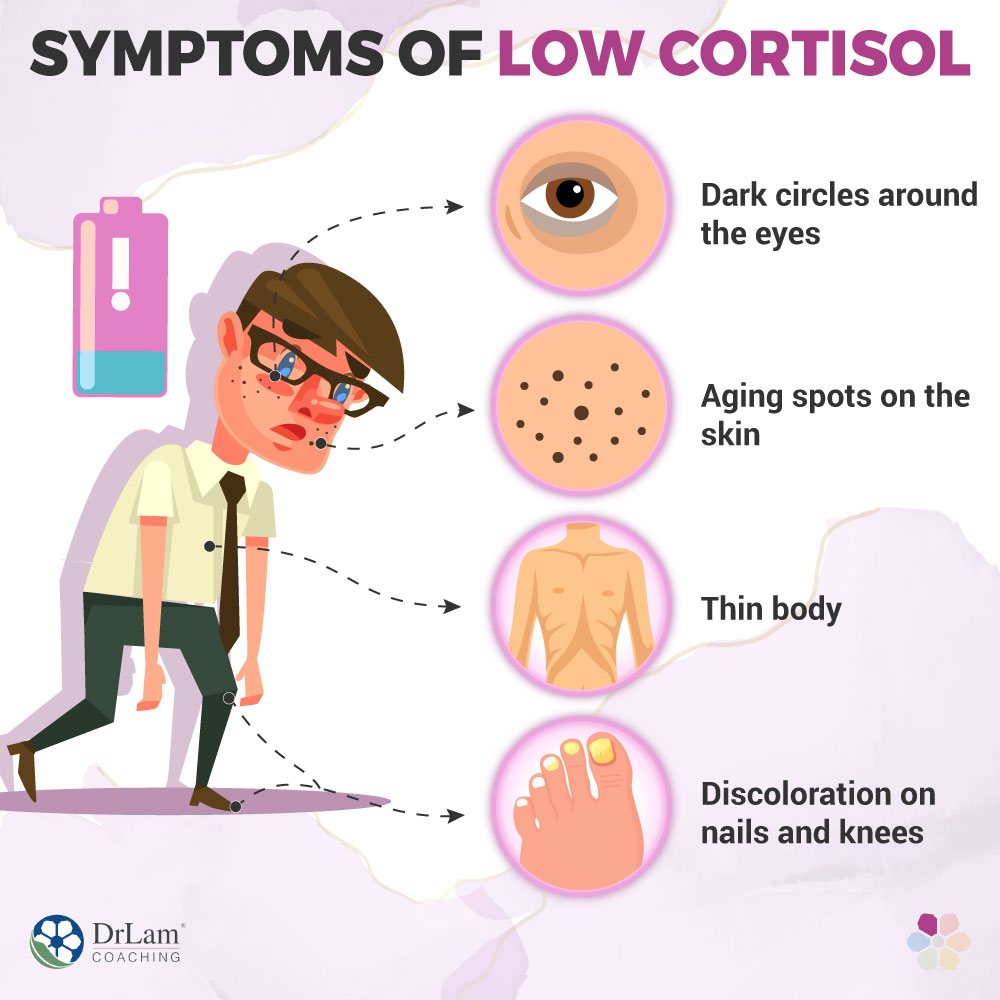
Low cortisol can cause fatigue. This is mainly caused by low blood sugar levels and low blood pressure as there isn't adequate cortisol to maintain these levels.
Low cortisol also leads to an increased sensitivity to stress. This is because the adrenal glands start to increase the production of other stress hormones such as adrenaline, and important electrolytes, such as potassium and sodium, can start to fluctuate within the body.
When cortisol is low, the immune system also becomes weaker, leading to an increase in inflammation in the body. This can result in fevers, flu, infections, and inflammatory conditions such as arthritis, eczema, colitis, and allergies.
Psychological symptoms can also occur with low cortisol. These include apathy, negative thoughts, and paranoia.
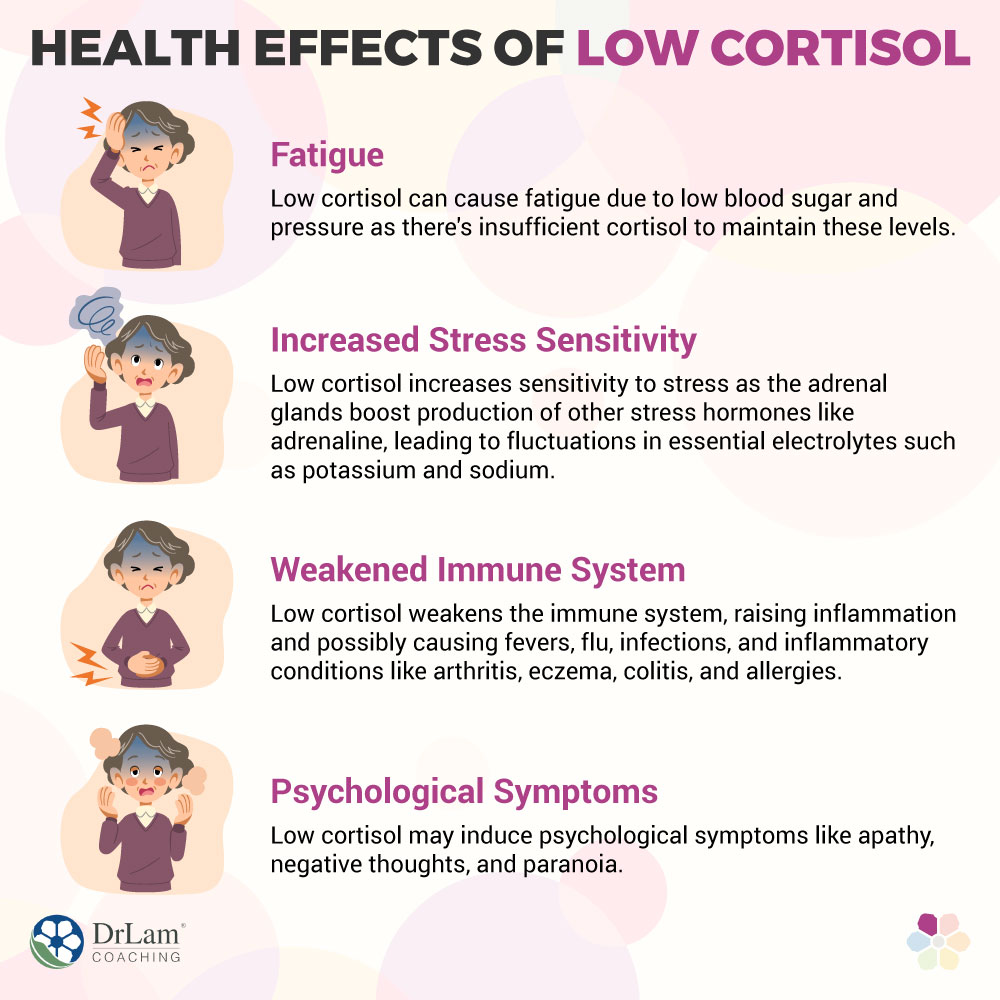
 Research shows these symptoms not only reduce an individual's quality of life, but they also reduce their longevity. Studies researching the effects of low cortisol and longevity found that individuals with low cortisol had higher mortality after experiencing a heart attack and were nine times more likely to die afterward compared to individuals with normal cortisol levels. Another study found that individuals with low cortisol levels were more likely to die from either a heart-related condition or an infectious condition. This risk was even higher in women with a low cortisol level.
Research shows these symptoms not only reduce an individual's quality of life, but they also reduce their longevity. Studies researching the effects of low cortisol and longevity found that individuals with low cortisol had higher mortality after experiencing a heart attack and were nine times more likely to die afterward compared to individuals with normal cortisol levels. Another study found that individuals with low cortisol levels were more likely to die from either a heart-related condition or an infectious condition. This risk was even higher in women with a low cortisol level.
Another dangerous condition that can result from a cortisol deficiency is an adrenal crisis. This is when cortisol levels become very low, resulting in blood sugar levels and blood pressure becoming dangerously low. Other symptoms of an adrenal crisis include:
Often an event sets off an adrenal crisis. These include stressful events such as surgery, pain, heat, strenuous physical exercise, pregnancy, gastrointestinal disorders, or stopping medication.
There can be a positive relationship between cortisol and longevity. This happens when cortisol is within the optimal range. The optimal ranges for cortisol in non-stressful situations are:
Under stressful circumstances, this changes to:
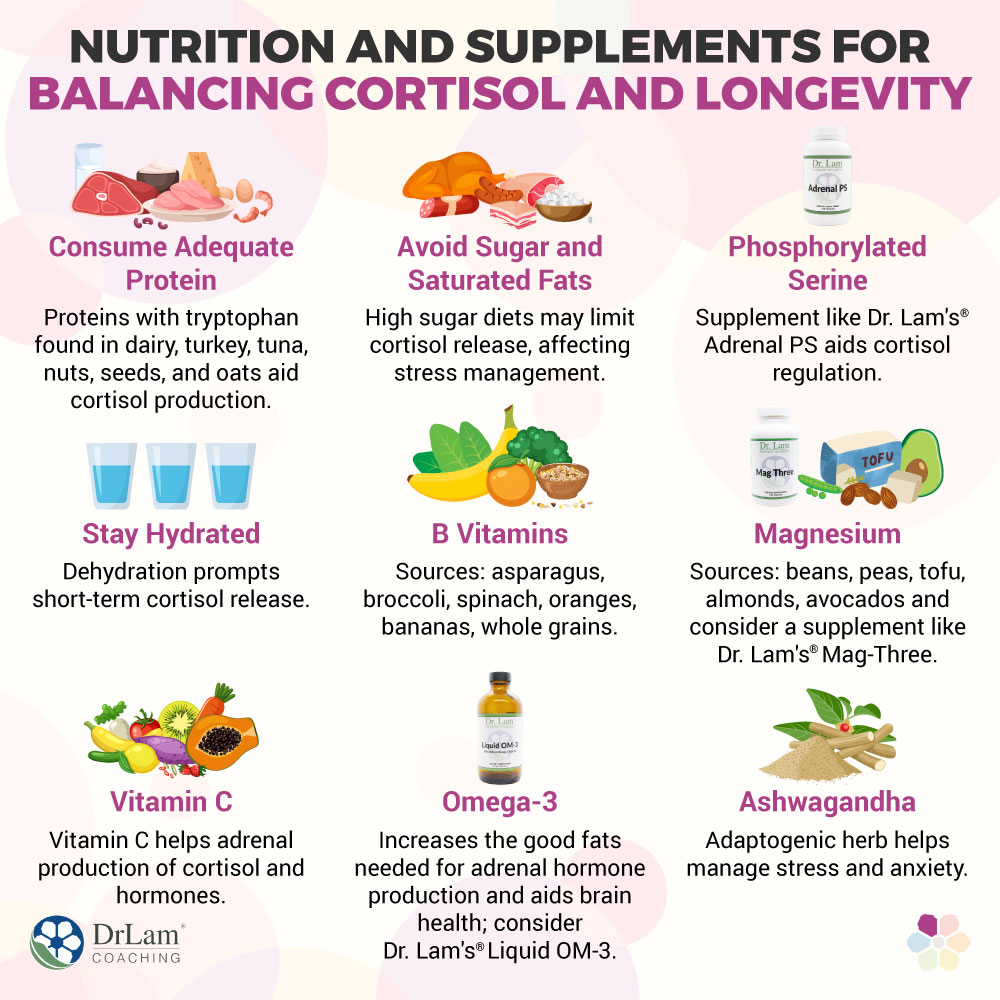
When cortisol levels are dangerously low or high, medication may be needed to assist recovery. However, there are natural strategies to help balance your cortisol levels as well, improving the relationship between cortisol and longevity.
Studies have found that individuals with a diet high in refined carbohydrates, saturated fats, and sugar had higher cortisol levels than individuals who had a diet rich in unrefined carbohydrates and unsaturated fats. Diets high in sugar also appear to suppress the cortisol release that accompanies stressful experiences, reducing your body's ability to handle stress.
Proteins contain amino acids, the building blocks of protein. One of these amino acids is tryptophan and it is involved in the production of cortisol. Without adequate tryptophan, your body cannot produce adequate cortisol. Consuming protein-rich foods helps to ensure that your body is receiving adequate tryptophan. Sources of tryptophan include:
Being adequately hydrated is also important to maintain adequate cortisol levels as dehydration has been shown to be associated with a short-term release of cortisol.
The B vitamins are also involved in the production of cortisol. These vitamins are water-soluble, meaning that they are not stored in the body and need to be taken in daily. Good sources of B vitamins include colorful fruits and vegetables. Some notable sources of B vitamins include:
When you think of the role of vitamin C in the body, you may think of its role in flu prevention however vitamin C has many important roles in your body. Your adrenal glands use vitamin C when producing cortisol, if your stress is prolonged it can cause your vitamin C levels to become depleted. This can then cause more stress to your adrenal glands and result in more cortisol being produced. Supplementing with vitamin C can help ensure that there are adequate levels and will prevent cortisol levels from further increasing.
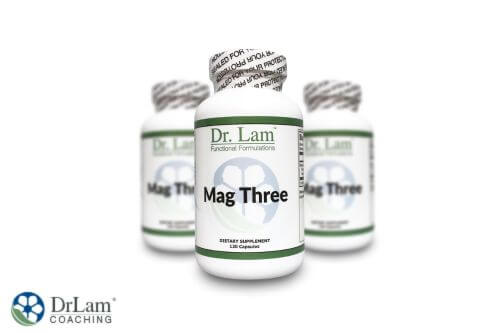 This mineral is involved in the metabolism of cortisol and will help to regulate levels of cortisol. Magnesium is found in a range of sources that include beans, peas, tofu, almonds, and avocados. If you are concerned about your levels of magnesium, you can take a supplement. Magnesium supplements are best absorbed at night. Dr. Lam's Mag-Three is a combination of magnesium citrate, glycinate and taurate for best absorption and utilization. Magnesium citrate usually helps the bowels move, magnesium glycinate has good absorption, and magnesium taurate helps relax blood vessels.
This mineral is involved in the metabolism of cortisol and will help to regulate levels of cortisol. Magnesium is found in a range of sources that include beans, peas, tofu, almonds, and avocados. If you are concerned about your levels of magnesium, you can take a supplement. Magnesium supplements are best absorbed at night. Dr. Lam's Mag-Three is a combination of magnesium citrate, glycinate and taurate for best absorption and utilization. Magnesium citrate usually helps the bowels move, magnesium glycinate has good absorption, and magnesium taurate helps relax blood vessels.
Fish oil is one of the main sources of omega-3, which has important roles in reducing inflammation, pain, and promoting brain health. Studies have also found that this oil can reduce cortisol levels. It's important to get this oil in through your diet with two servings of fatty fish a week. If you are struggling to achieve this, a fish oil supplement like Dr. Lam's Liquid OM-3 can help.
This compound is a form of serine that has the addition of phosphorus. Serine is a non-essential amino acid that your body produces and can help in regulating cortisol levels. Supplementing with this form of serine can help to reduce cortisol levels in the body. Dr. Lam's Adrenal PS is a great supplement to take four times a day to help modulate cortisol levels throughout the day.
This is an adaptogenic herb and can help to manage stress and anxiety. Studies found that cortisol levels reduced after two months of taking a dose of 240mg. However, this study was with a small group of participants and more research is necessary.
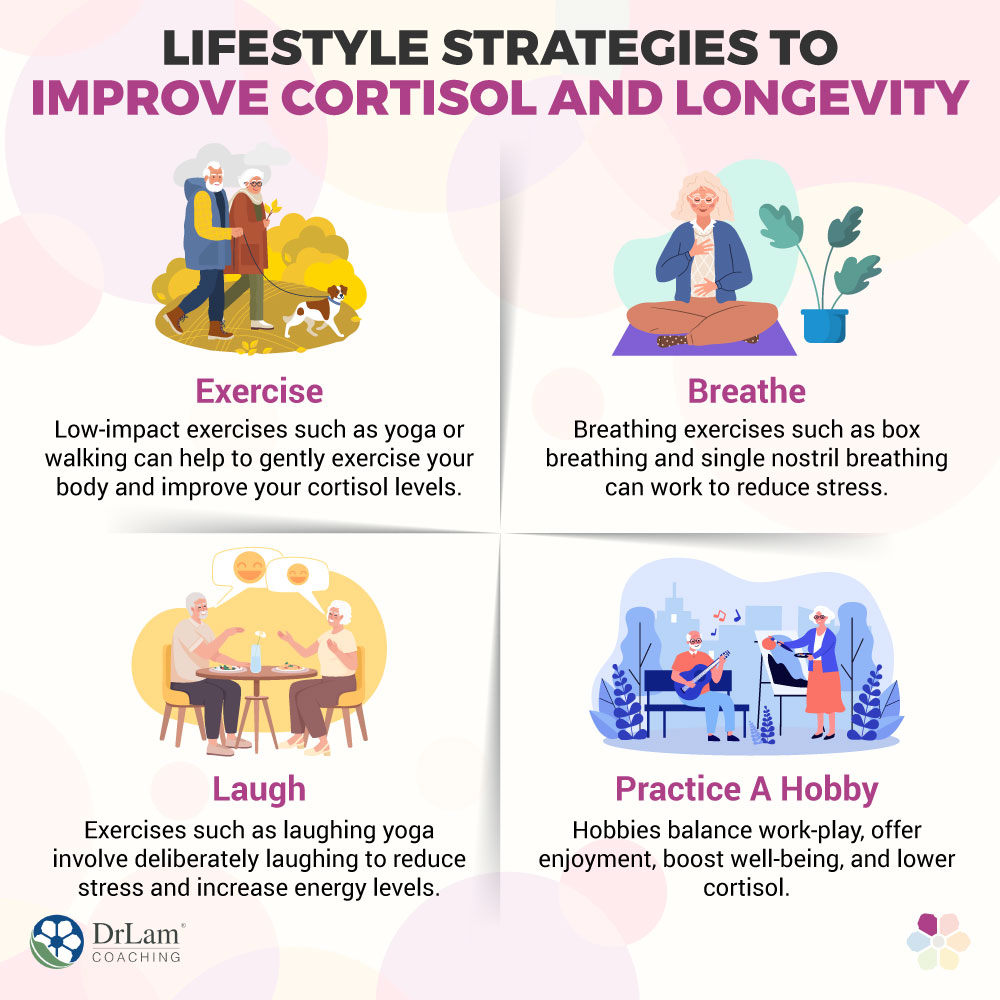
Several lifestyle changes can also help to either raise, lower, or regulate cortisol levels to improve overall longevity.
Research suggests that some kinds of exercise can help to reduce stress hormones in the body such as adrenaline and cortisol. However, if you are experiencing a high cortisol level, it is also important not to over-exercise, as this can aggravate your cortisol levels. Low-impact exercises such as yoga or walking can help to gently exercise your body and improve your cortisol levels. This can also improve breathing and sleep quality, which can also help to reduce cortisol levels.
You may have noticed that when you are stressed or anxious, your breathing patterns can change from deep breaths to short shallow breaths, or you may hold your breath. This can aggravate the stress your body experiences.
Likewise, research has found that breathing can have beneficial effects on your cortisol levels and can help with stress management. Deep breathing helps to relax your nervous system and activate the "rest and digest" response rather than the "fight or flight" response. This helps to move your body from a state of stress to a state of restfulness and helps to reduce cortisol levels. Breathing exercises such as box breathing and single nostril breathing can work to reduce stress. Practices such as mindfulness, meditation, yoga, and tai chi that use breathwork in combination with gentle movements can help as well.
 The old saying "laughter is the best medicine" may have a bit more weight to it than you originally thought. Laughter stimulates the release of endorphins, feel-good hormones, and also suppresses cortisol. This was found with both natural as well as forced laughter, so if you aren't finding the funny in life, you can always fake laugh, at least until it makes you laugh for real. The good news is that you don't have to do this alone. Exercises such as laughing yoga involve deliberately laughing to reduce stress and increase energy levels.
The old saying "laughter is the best medicine" may have a bit more weight to it than you originally thought. Laughter stimulates the release of endorphins, feel-good hormones, and also suppresses cortisol. This was found with both natural as well as forced laughter, so if you aren't finding the funny in life, you can always fake laugh, at least until it makes you laugh for real. The good news is that you don't have to do this alone. Exercises such as laughing yoga involve deliberately laughing to reduce stress and increase energy levels.
It's important to have a life apart from work, and that's where hobbies come in. Hobbies can help you to have a balance between work and play and can give you something to do that you enjoy. They help to improve well-being and have been shown to reduce cortisol levels. So rather than sitting on the couch in front of the TV after work, do something you enjoy. If you don't have a hobby, there are a range of different ones to choose from that you can try.
Using some of these strategies can help improve both cortisol and longevity. However, if you are experiencing AFS, it is important to do this with mindfulness and caution. In AFS, your body can become very sensitive to exercise, new foods, and supplements. Your body may react negatively, and this could set you back in your healing journey.
It's important to be mindful of the type of exercise that you do, as anything too strenuous will affect your cortisol levels.
Supplements are not regulated by the FDA, with the safety and quality of ingredients not being guaranteed. AFS can also affect your gut health and may cause your gut to become overly sensitive to any new food products that are introduced into your diet.
This makes it important to have the support and guidance of a healthcare professional who can guide you in terms of effective strategies that will not only support your cortisol and longevity but will also work with any other health conditions you may be experiencing.
Cortisol plays an important role in the body, and when levels are either low or high, not only can it affect your health, but it can also affect your longevity. Whilst medical support is sometimes needed when these levels are out of range, there are also some strategies that you practice to improve your cortisol and longevity. These include:
If some of these symptoms of a low or high cortisol level resonate with you, you may need the support of a team specializing in stress and cortisol. The team at Dr. Lam can assist. Call +1 (626) 571-1234 or click here for a free initial consultation.
Caplin, A, et al. "The Effects of Exercise Intensity on the Cortisol Response to a Subsequent Acute Psychosocial Stressor." Pschoneuroendocrinology, vol. 131, September 2021. https://pubmed.ncbi.nlm.nih.gov/34175558/
Ma, X, et al. "The Effect of Diaphragmatic Breathing on Attention, Negative Affect and Stress in Healthy Adults." Frontiers in Psychology, vol. 8. June 2017. https://www.ncbi.nlm.nih.gov/pmc/articles/PMC5455070/
Soltani, H, et al. "Increasing Dietary Carbohydrates as Part of a Healthy Whole Food Diet Intervention Dampens Eight Week Changes in Salivary Cortisol and Cortisol Responsiveness." Nutrients, vol. 11, no. 11, 2019. https://pubmed.ncbi.nlm.nih.gov/31652899/
Krause, EG, et al. "Hydration State Controls Stress Responsiveness and Social Behaviour." J. Neurosci., vol. 31, no. 14, 2011, pp. 5470-6. https://pubmed.ncbi.nlm.nih.gov/21471383/
Madison, et al. "Omega-3 Supplementation and Stress Reactivity of Cellular Aging Biomarkers: An Ancillary Substudy of a Randomized, Controlled Trial in Midlife Adults." Mol. Psychiatry. vol. 26, no. 7, 2021, pp. 3034-42. https://pubmed.ncbi.nlm.nih.gov/33875799/
Lopresti, AL, et al. "An Investigation into the Stress-Relieving and Pharmacological Actions of an Ashwagandha (Wthania somnifera) Extract: A Randomized, Double-Blind, Placebo-Controlled Study." Med. Baltimore. vol. 98, no. 37, 2019. https://pubmed.ncbi.nlm.nih.gov/31517876/
Meier, M, et al. "Laughter Yoga Reduces the Cortisol Response to Acute Stress in Healthy Individuals." The International Journal on the Biology of Stress. Vol. 24, no. 1. 2019, pp. 44-52. https://pubmed.ncbi.nlm.nih.gov/32393092/
Pressman, SD, et al. "Association of Enjoyable Leisure Activities With Psychological and Physical Well-Being." Psychosom. Med. Vol. 71, no. 7, 2009, pp. 725-32. https://www.ncbi.nlm.nih.gov/pmc/articles/PMC2863117/
Cerit, H, et al. "The Effect Of Tryptophan on the Cortisol Response to Social Stress is Modulated by the 5-HTTLPR Genotype." Psychoneuroendocrinology. Vol. 38, no. 2. 2013, pp. 201-8. https://www.sciencedirect.com/science/article/pii/S030645301200193X
Balancing your cortisol levels can change the relationship between cortisol and longevity from negative to positive. Your longevity may already be impacted due to a high or low cortisol level. However, balancing your cortisol level will reduce the chance of it further affecting your longevity in the future.